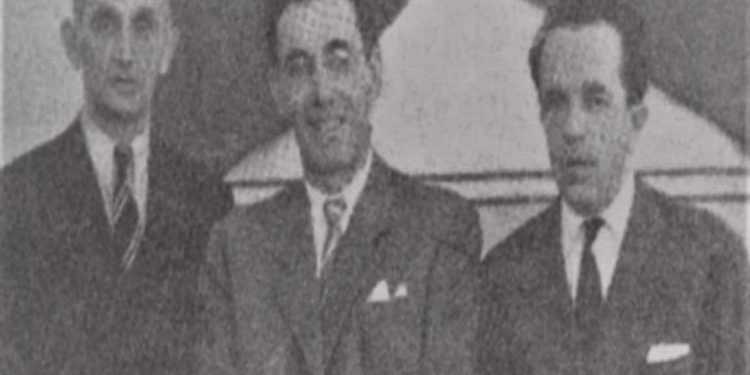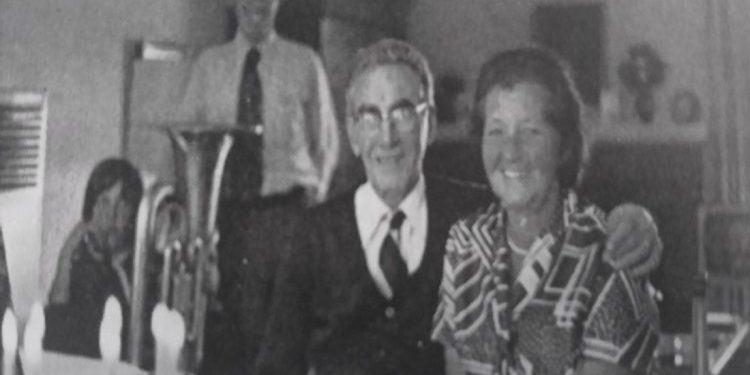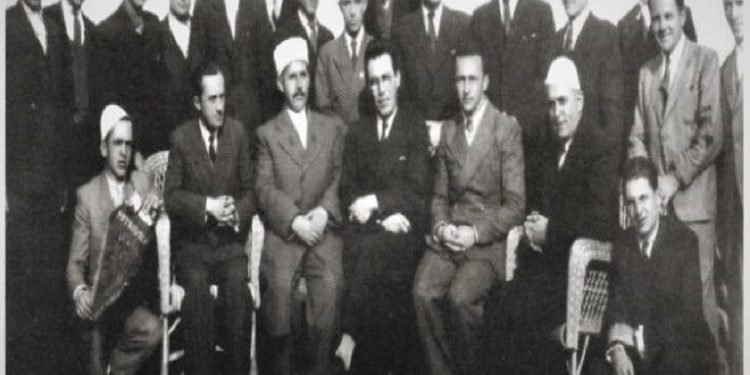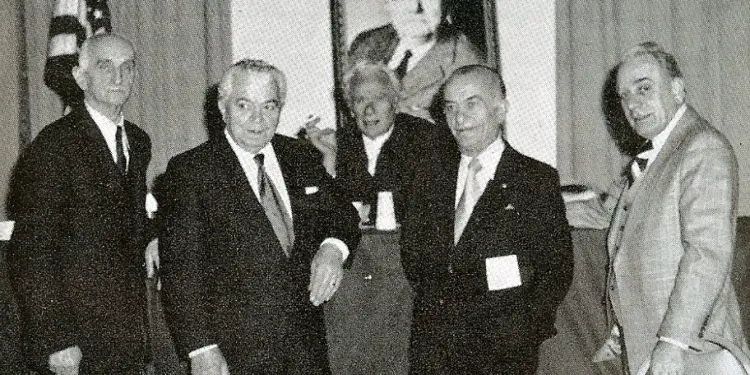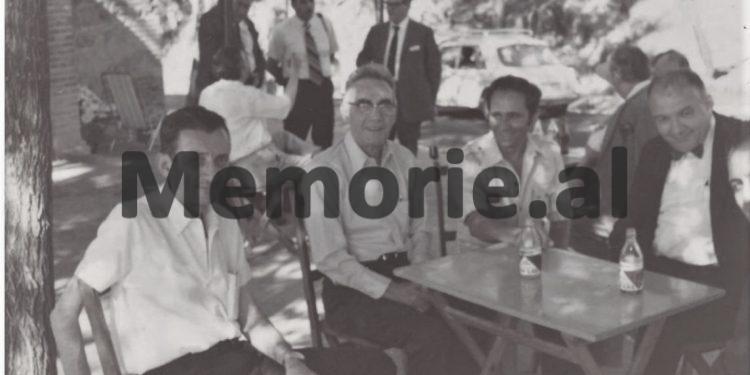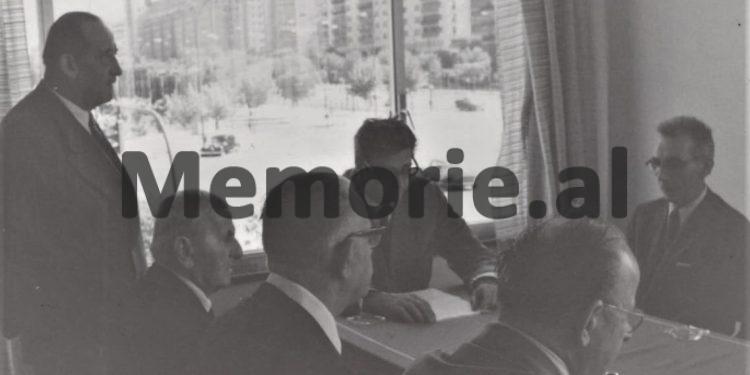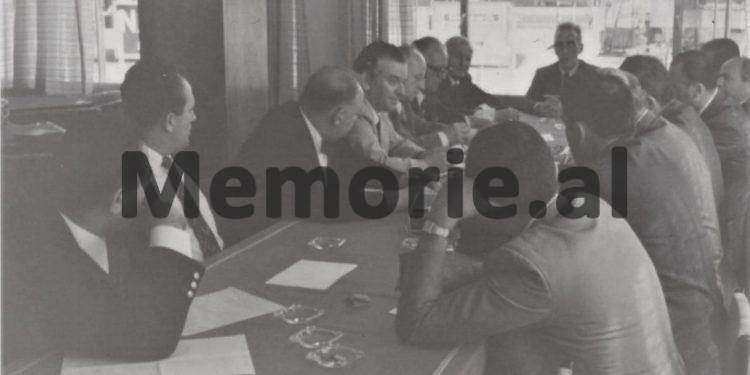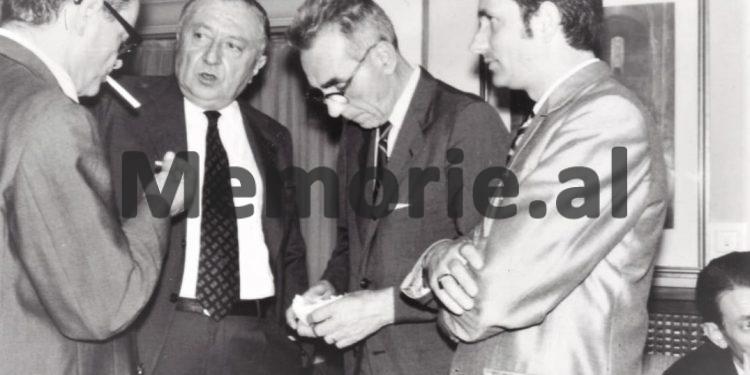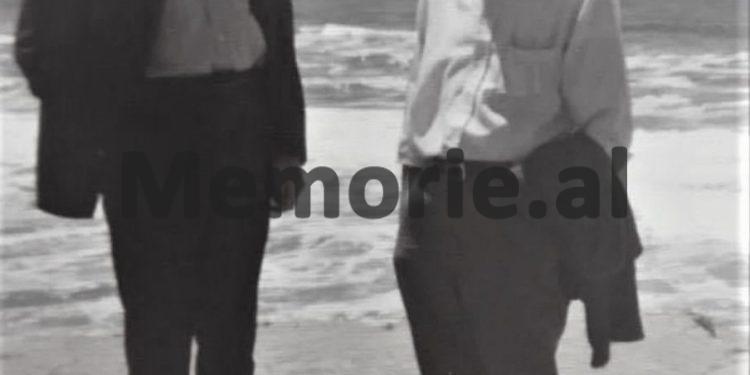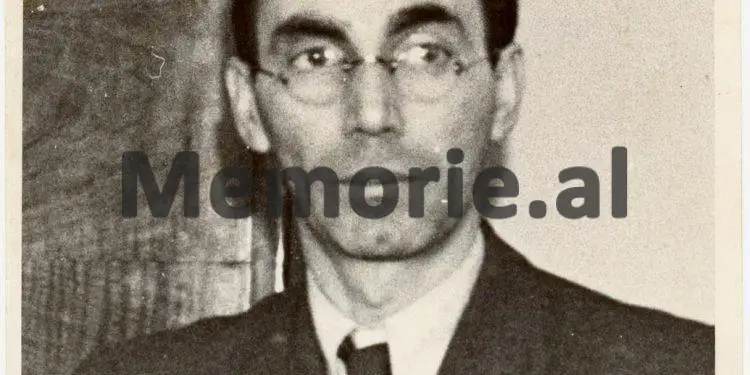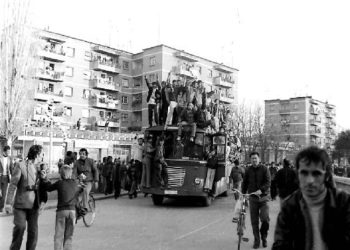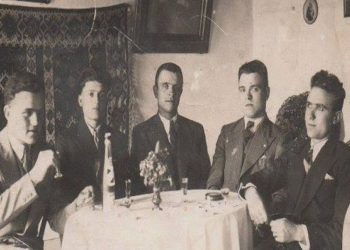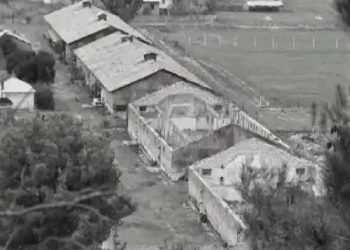By Idriz Lamaj
Part twenty-five
From the works of the apostles of ethnic Albania
Xhafer Deva
In light of his own letters and other diaspora revelations
Preface
Memorie.al/ Probably like many others, I often browse letters with my friends and associates, who are no longer in this life. Browsing through them, for a moment unfolds memories that it seems to me that some of them can serve our history. Then, I return to the awareness of the current difficult situation in the ethnic homeland, caused by the quadruple of Albanian politics, I say to myself: “What can my memories of others or the letters of the people of dead? ”
Without being the ominous instigator of pessimism, thinking as always of a better future, I return to my obligations to my friends, and as an icy observer of time, without any claim of historical service, when I am given the opportunity of publication, write what I have in mind, always based on their writings and letters. This principle is also followed in this book about Xhafer Deva. I knew Xhafer Deva in person; we exchanged visits and had a strong correspondence.
I spent days off at his house and inherited all of Xhafer Deva’s correspondence with Rexhep Krasniqi, his closest friend, for more than 40 years. After many years, I talked on the phone with Mrs. Deva’s daughter and son-in-law. In the conversation going on, taking advantage of the old friendship, I asked about his letters and they informed me that it was all Qefali Hamdia, a friend of their family.
In June of last year (2001) I went to Kenosha, Wisconsin, a guest of Qefali Hamdia, to look at Xhafer Deva’s correspondence, which Mrs. Deva sent her years ago, when she, due to her advanced age, was closed his house to go to the house of his 5th daughter and son-in-law, Mrs. Burgl Dagmar and Rev. Dennis Logie.
After reading the bulk of the letters, in the languages I knew, I took with me more than a thousand pages of his correspondence, covering a period of over 30 years, 1945 – 1978. Xhafer Deva spoke and wrote seven – eight languages. His correspondence is: Albanian, English, German, Italian, French, Turkish and Serbian. Xhafer Deva’s letters and writings, with the exception of those in Old Turkish and Serbian in Cyrillic, are mostly typewritten, well-kept and alphabetically arranged, with the persons he was dealing with.
That includes his family letters. He carefully kept a copy of every letter he sent and every letter he received. Mrs. Oswalda Deva, daughter Burgl, son-in-law Dennis Logie and Mr. Qefali Hamdia with family, expressed his heartfelt thanks for the trust they gave me. With special gratitude I recall here the help given to me by my brothers – Captain Nue Gjomarkaj and Nikoll Gjomarkaj, in the preparation of one of the most important chapters of this book.
Kapidan Nou, in addition to making available the subject on Xhafer Deva’s relations with the ‘Independent National Bloc’ and sending paratroopers to Albania and Kosovo, reviewed with me each document of that period, and we formulated the text in the form of a conversation; while Nicholas, deciphered the letters, transcribed and translated from Italian, the unpublished materials to date, which were published in this chapter.
Continues from the last number
Xhafer Deva’s life and activity in exile
– Kosovo in the time of Ethnic Albania –
Xhafer Deva in the light of his own letters
In the United States.
Xhafer Deva’s last message: – Keep alive the ‘League of Prizren’
The main goals for maintaining and subsidizing this perfect organization are:
a) To change (as stated above) the clique of Enver Hoxha and Mehmet Shehu, but to preserve the communist regime as a vanguard of Pan-Slavism;
b) To reduce the value and morale of the ‘First League of Prizren’, led by the patriots of our national Renaissance and to make the name of the ‘Second League of Prizren’, renewed in 1943, disappear, which is still alive in the hearts of devout Albanians for our national unity. Precisely to keep that name, of the ‘League of Prizren’, the refugee organization first took the name ‘League of Prizren’, but the Serbs soon realized that the name evoked dangerous feelings for them and ordered the name to be changed to the Organization Political-War of Albanian Refugees in Yugoslavia;
c) To create a constant disturbing psychosis and anxiety in the minds of Albanians in order for them to be preoccupied only with political issues of foreign cliques and ideas and to forget their national and ethnic cause; d) To arouse anti-Western sentiment, in particular anti-Italian and American;
e) To detach the Albanians from their way and from their political problems and to create the belief in them that only the Yugoslavs are the most trusted and best defenders of the unfortunate Albanians of Albania halved by the Slavs themselves. The Yugoslav actions in Albania started immediately after the end of the Second World War and those actions are listed chronologically below:
- Trade and textile enterprises, food and any Albanian movable property were transported to Yugoslavia under the pretext that they were the fruit of the enrichment of the fascist reactionaries during the War and consequently, those assets were first distributed to the inspirers and contributors of the liberation war, i.e. th., to be given to the Yugoslav brethren;
- All publishing houses, confiscated books and national symbols printed during and before the War, to be banned and burned, publicly. Each curriculum should be in line with the curricula of Serbia;
- Learning foreign languages was banned, with the exception of Serbian and Russian, the first of which was compulsory in schools for all clerks;
- Most of the patriotic intellectuals who expelled the slightest contempt for the Yugoslavs were expelled and killed;
- Foreigners were expelled, Italian technicians, no technicians remained in Albania, but even those few Albanian technicians became slaves of Slavic technicians;
- The entire institution of the Catholic Church in Albania was uprooted, claiming that the Church was in the service of Italian imperialism. But, all Albanians know well that the Catholic Church in Albania, and especially the Franciscan Brethren have always been, only the hearth of Albanian patriotism and have been highly valued and respected by all Albanians without exception of religion and province. Meanwhile, a good part of the clergy of the other two faiths, Muslim and Orthodox, who did not obey Belgrade’s orders were arrested, imprisoned and many of them disappeared altogether;
- All those who uttered or remembered Kosovo and Kosovars were sentenced to death. From this one imagines what fate awaited the brothers left outside the border under the Titoist regime;
- Mandatory meetings were held daily in the smallest centers and in the most remote villages to arouse love for the Yugoslavs and hatred for the Western world, especially for America and Italy, which after them kept Trieste occupied; They exploited and plundered all the minerals and transported them to Yugoslavia; They exchanged and devalued the Albanian currency from 1 All to 3 dinars, made 1 dinar three All;
- They sabotaged and overthrew the entire economy of the country to find a pretext to accuse the Albanian leaders and to replace them with Yugoslavians, which became clear during the trials held after the secession with Yugoslavia in 1948. After the Inform bureau resolution, the state leaders Albanians remained loyal communists of Moscow and therefore Yugoslavia organized, various groups of saboteurs to Albania, a number that was increasing every month. Hundreds of saboteurs with propaganda materials and brochures infiltrated Albania from Yugoslavia, as well as receiving and delivering clandestine mail, many times without knowing and understanding their content, by persons unprepared for such missions, ordinary people of who were forced to obey the orders of the UDB perhaps only out of threat and fear of anything being done to them, but did not act according to the directives of the country where they were.
The activity of this organization is increasing and deeply shakes the whole Albanian nationalism wherever it is, because unfortunately there is no other organization to oppose it and take Yugoslavia out of the political game. The political and economic conditions of the Albanians under Yugoslavia, whose number, according to census sources, April 1953 – reaches more than one million, are extremely difficult. The constant influx of refugees in Italy, including Albanians, proves this. Belgrade has promised Albanians freedom in the beautifully formulated statute, but this statute remains only a document for the Belgrade archive. Kosovo, whose name in Kos-Met has been distorted, is only described as Obllast, which does not even have the capacity for real autonomy. The Albanian language is not used in any official state work. Albanian schools are just an external cover of the rights of Albanians, because in those schools nothing is taught with real Albanian content.
Albanians under Yugoslavia are forced to think and act as if they were simply Serbs or Montenegrins. There is not a single family in the entire Albanian territory that has not been persecuted and has not lost its sons or anyone else. The most reduced figure since 1944 to date exceeds 40,000 people. In the different prisons of the three republics, there are about 20,000 Albanians every year. We mention here ironically that Yugoslavia is a member of the United Nations, as a permanent member of the protection of human rights. She raises her voice and defends the Vietnamese, Koreans, blacks, etc., but with the greatest shamelessness, she will not know about the oppression of the peoples who are considered as national minorities in Yugoslavia, among whom are the Albanians, who do not have no one to support or protect or expect any help. Usually the economic situation in Yugoslavia is as bad as in any communist country, but with a change here due to Anglo-American aid.
Unfortunately, the situation of the Albanians is deplorable, as not only was everything they had at the end of the Second World War seized, but their lands, houses and property were distributed to the Serbo-Montenegrins and Macedonians. Taxes for Albanians are constantly increasing. Agriculture after the division of lands has become a cooperative of the new Marxist system. It should be noted that while the cooperative system has been abandoned in most parts of the country, due to low productivity, not to say completely failed, on the contrary they have been forced not to abandon that system in any way failed, because Albanians only have to pay, while Slavs do not. We also mention that politically, economically and administratively, the Albanians in the Republic of Montenegro cannot be helped by the Kosovo Albanians, by the so-called ‘Oblast’ of Kosovo or by those of Macedonia because they are supposedly divided into republics different. Albanians can therefore not have contacts between them, administrative and cultural contacts and consequently no political contact except those contacts that are located in Belgrade.
The denationalization of Albanians by legal and illegal means is the main goal of Montenegrins who dominate Yugoslav politics. They achieve this goal:
1). With school programs and Slavism of all Albanian youth;
2). With terror and persecution, and under the pretext of ostensibly Turks, to move Kosovar Muslims to Turkey. This measure, which was the most dangerous between the two World Wars, is now just beginning after the improvement of diplomatic relations between Belgrade and Ankara. The fertile lands emptied by the Albanians are occupied by Serbs, Montenegrins and Macedonians (these are Macedonians who came from Gevgelie – Gevgelija – who came from Greece). To this must be added the obligation of their parents who speak Turkish but are Albanians, their parents who by the drastic pressures of the regime, are forced to force their children to go to Turkish schools officially opened on March 8, 1951 in the region of Kosovo. So far, 860 families have been transported to Turkey, with more than 5,000 people. This year, another 600 families are planned to leave, farmers, ranchers and craftsmen.
UDB officials are based mainly in the Albanian area of Yugoslavia. They oversee and terrorize locals who have simply been enslaved in their own homes. Various actions of the UDB have been concentrated in Kosovo, for mobilization towards the territory of the Albanian political state. From 1948 until today, in such actions undertaken by the UDB, more than 300 people were sent to Albania as saboteurs, including Kosovars. This has led to an increase in terror by the communist government of Tirana, against the border areas of Albania. Here we mention some of the fallen: Zek Smajli from Lohe of Shkodra; Nikoll Zef Alija from Hoti; Frano Finding from Kastrati; Mark Nikoll Sokoli from Dukagjini; Marash Mirashi from Lezha; Preng Lulashi from Lezha; Pjeter Bajraktari with three others from Fandi of Mirdita, Dan Kola from Luma with four other people; Kol Gjergji from Lohe of Shkodra; Nue Gjon Deda from Kelmendi; Ndoc Vata from Plani; Maksut Selimi from Pogradec, etc., etc.
The central organs of the Communist Party and the Yugoslav state have managed to create secret channels with senior officials of the Communist Party of Albania, to trap Albanian nationalists on both sides of the border. This is confirmed by the fact that the Committee that was established in Prizren, now based in Pristina, composed mainly of nationalists is led by a minority, some 20 percent of communists, who in Albania after terrorizing the people and each other, now operate freely in Yugoslavia, use the relatives of the persecuted for their own purposes, hiding in Yugoslavia. The nationalist immigrants asked for nothing and they approve of the UDB orders, only out of fear and evil that may come to them at any moment; they are obliged to participate in this typical Yugoslav political organization. It is natural that the anti-Albanian treatment has upset everyone, but they have nothing to do.
They do not find any support anywhere, nor do they have a means of escape, if Yugoslavia allowed them, they would all quickly emigrate to the West. To illustrate, here we are giving an example of a nationalist immigrant who, I refuse the Yugoslav authorities to go on a mission to Albania. In June 1953, Nikoll Zefi from Dukagjini, was forcibly sent to Albanian territory and on the other hand, he was reported by the Yugoslav side to the State Security in Albania. The envoy was immediately surrounded by large Security forces and after a desperate fight, he was killed along with five other people, in a place called Vau i Valbona. To the Albanian emigrants in Montenegro, in a conference held by UDB, it was openly stated: “Look how we know how to punish those who do not obey us, those who are traitors to our political line.” Another person, Mark Mhilli, after hearing those words and not wanting to go on duty in Albania, stated that he preferred to go to prison and in fact he is in prison today with eight other people.
Examples like these abound in concentration camps or prisons, where they are forced to work without pay. Among them we are mentioning here, Niksic camp in Montenegro, Raska camp in Serbia, Gerovo in Croatia. The Plevles camp in Montenegro and the Golesh camp in Kosovo are also terrible for Albanian emigrants. There are many Albanian political emigrants in the infamous Idrizovo prison near Skopje. On July 12, 1953, a group of nationalist immigrants with Nue Bajraktar, Vesel Tahiri and Kol Bajraktar and several others, prepared to flee to Greece. A spy discovered their attempt and as a result 14 people were arrested and convicted, who were sentenced from 16 to 4 years in prison. Only Kol Bajraktari, after a dangerous attempt, was able to cross the border and is in Greece today. Their letters leaving Yugoslavia for their brothers in the West are censored, as are those leaving the West for Yugoslavia.
All-important or suspicious letters are photographed. Thus, General Dushan Mugosha himself expelled Shehat Tonuz from Dibra, who was a member of an Emigrants Club, by issuing him the letter he had sent to an immigrant personality from the West, although Mr. Tonuzi, that person was a relative. Both local Albanians and emigrants who are in Yugoslavia are very desperate for quarrels between Albanian political parties in the West, because the entire Albanian people on both sides of the ethnic border are waiting for the coordination of Albanian nationalist forces in the West, for liberation. of ethnic Albania from communist rule and Yugoslav occupation. The political passivity of the National Committee “Free Albania” and the restriction of its activity as well as the dim propaganda on the issue of the liberation of ethnic Albania, as the only representative of the cause of Albanian nationalism and non-participation in any form of ‘Second League’ of Prizren ‘in this Committee has caused demoralization and deep doubt in its mission regarding the issue of ethnic Albania.
It is my duty to close this relation by pointing out that as always throughout the historical epochs, I do not think it is wrong, as the great men of the Italian and American states, to examine essentially the brief content presented here in order to, to determine Moscow’s real purpose in its policy with Yugoslavia, as its vanguard for the spread of pan-Slavism in the Balkans. Therefore, any kind of agitation on the part of the allies for the liberation of Albania through the Yugoslavs puts our country back under the dictatorship of Belgrade from 1944 to 1948, and this would have been the biggest mistake and the biggest national tragedy for the Albanian people and state. These two allied countries of the Albanians, Italy and the United States must unreservedly support the realization of a free ethnic Albania. The exit of the Kremlin to the Mediterranean through the Adriatic, these two allied countries of the Albanians, can be blocked only with the realization and strengthening of a truly ethnic Albanian state. Xhafer Deva sent this report to the Italian and American Foreign Ministries, at the end of 1953. The original text in Italian was translated by Mr. Uran Kostreci.
Xhafer Deva’s speech on the occasion of the 25th anniversary of the founding of the Independent National Bloc.
Mr. Chairman, Mr. Honorable, As Mr. Ndreu, z. Gjomarkaj, Mr. Verlaci, and later the other gentlemen who spoke, did not leave much room for me because they touch on all matters. So did Mr. Vasil Germenji e z. Rexhep Krasniqi, therefore I am staying only at the point maybe I have worked with them, and I have to congratulate all the blockers for celebrating and inaugurating the 25th anniversary of the ‘Independent National Bloc’, to stay in union over which the last speaker spoke . The efforts of the Albanian emigration have always been in this direction. I said this after I had the opportunity to push a little, as a Kosovar I am, for Albanians to unite, for Albanian talents in exile to unite to contribute to the Albanian cause. We Kosovars, as in the past and as now, have not changed. Our hopes are in the liberated Albanian. We, without a liberated Albanian, have nothing to do with me! There is nothing we can do! For this reason, if someone really and sincerely wants to see a union of Albanians, I believe that we are the first.
I have to go now in 1949. Then there was an attempt by the representatives of various parties in Alexandria, of Albanian political parties, where I also had the honor to participate. Then a kind of “Covenant” was created, as most of you know. The card was written and signed but nothing was done. We must learn from this chord: we must say the mistakes we have made so far. Let us learn from past mistakes, let us not curse our husbands, let us not use words like a criminal, because I am the number one criminal for the communists and I am not ashamed at all, because they call me a criminal from their point of view. The problem of Kosovo, as you know, is more complicated than that of Albania. They confuse me because we are really dealing with a strong enemy. Today is the occasion for the Albanians to try wisely and wisely to talk, to beat their thoughts, to contribute as much as they can for the liberation of Albania. To contribute each with concrete work but not with ideological principles. Let’s leave the ideology for a liberated Albania, for a free Albania with a democratic system. We probably have 25 or 30 parties there, with two and a half million people.
Exile is not the place to propagate things that do not help the cause. To judge properly, let us not deal with the past: who did and who did not, who is a spy and who is not, who is a patriot and who is not. We are all patriots but each in his own way. As for us Kosovars, we cannot join you here in exile, because we harm you, and you harm us. We have to be realistic. The policy we express is expressed in the Congress we held five years ago and that is: self-determination. This political line shows everything. We do not have an ideology, we have a single goal: to liberate the Homeland and our enslaved countries. Without a free Albania, there can be no Kosovo united with Albania. We have had this market in the past, 26 years ago. Kosovo has given its contribution to Albania and has tried to strengthen Albanian nationalism. This has always been our way. Now I wish for days, what help you ask from us and what we can do to help you. Our hopes are alive and one day I know that we will be released. Thank you for the great opportunity to greet you warmly and wish you good work and success. Memorie.al




